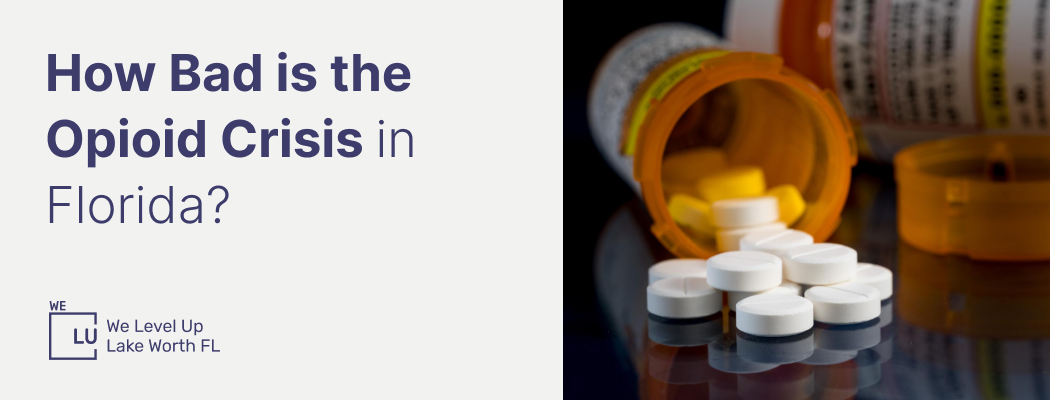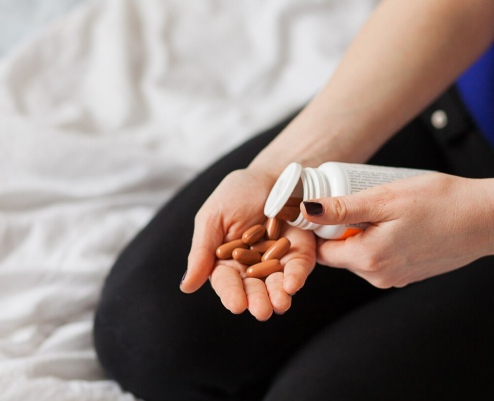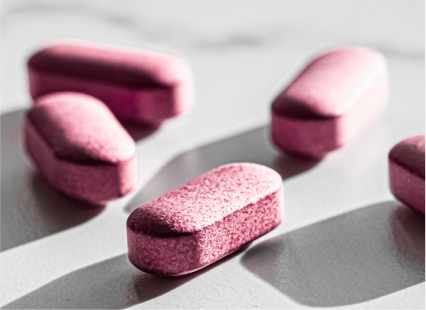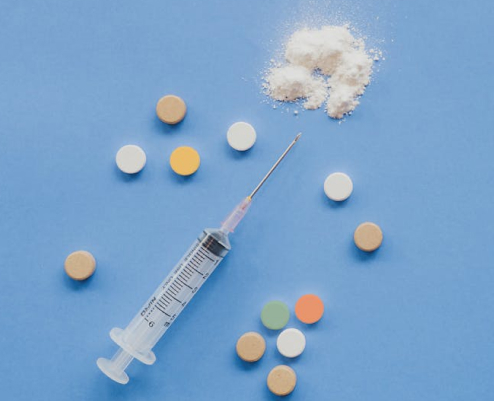As a result of the epidemic of opioid addiction, overdoses, and fatalities it has created, the opioid crisis has been recognized as a major national health concern. The opioid epidemic has hit every state hard, but unfortunately, Florida has seen an especially sharp rise in cases involving these harmful drugs. So, how bad is the opioid crisis in Florida? We Level Up Lake Worth FL will explore this subject, highlighting the effects of opioid abuse. We’ll also discuss the importance of finding the right rehab center in Florida and the necessity of professional help to combat addiction to this dangerous drug.
The opioid crisis in Florida
The number of fatalities caused by opioids increased for the fourth year running in 2017. According to a report by the Florida Department of Children and Families, the number of fatalities caused by opioids increased from 3,922 in 2016 to 4,279 in 2017, representing a 9% rise. Deaths resulting from the use of multiple opioids went up from 1,734 in 2016 to 1,878 in 2017, which was an 8% increase.
As we can see, the opioid crisis is clearly a major issue in the Sunshine State. Numerous people, households, and entire neighborhoods are impacted. The research also revealed that 91% (or 3,895 of the total) deaths were white people, indicating that this race is very prevalent. Also, men made up as much as 69% of the fatalities. The statistics presented here highlighted the critical need for immediate targeted interventions and community support.
Origins of the opioid crisis
A curious person might ask – how did the opioid crisis start? Obviously, the opioid pandemic didn’t happen overnight. The involvement of long-established pain treatment procedures and prescription medications is where it all began.
Opioids were originally used primarily to alleviate pain following surgery or to manage cancer-related discomfort. The late 1990s marked a turning point, though, when pharmaceutical corporations began aggressively marketing opioids for a variety of pain conditions, convincing the public that the pills were safe and posed little risk of addiction. As a result of these assertions, there was a dramatic spike in the number of prescriptions written for chronic conditions such as back pain and arthritis.
Are doctors to blame for opioid crisis? To a certain degree, they found themselves in a challenging situation. Their goal was to ease their patients’ agony, and the available data indicated that opioids were helpful. The potential for these medications to be addictive was, unfortunately, underestimated.
Nevertheless, blaming only doctors oversimplifies the issue. The pharmaceutical industry significantly contributed to the promotion of these drugs, alongside deficiencies in regulatory policies that intensified the crisis. Things have gotten even worse due to factors like economic hardship and a lack of mental health and comprehensive healthcare facilities.

The rise of opioid overdoses
How bad is the opioid crisis in the US? To understand this, let’s fast forward from 2018 to the CDC’s research findings and the three different phases of the rise of opioid overdoses.
The first phase started in the 1990s when there was a big jump in the prescribing of opioids. This led to an increase in deaths from overdoses linked to prescription opioids, including both natural and semi-synthetic opioids, as well as methadone, beginning as early as 1999.
The epidemic entered its second phase in 2010, with a dramatic increase in heroin-related overdose deaths. Sad to say, this indicated an evolving crisis that extended beyond prescription medications.
In the next three years, the crisis had evolved into its third phase, marked by a surge in deaths from synthetic opioids, particularly illicit fentanyl. Things escalated quickly because fentanyl is frequently combined with heroin, counterfeit pills, and cocaine, making it even more dangerous.
State and Federal responses to the crisis
Both the federal government and the state of Florida have recognized the urgent need to address the rising opioid crisis without delay. The idea is to reduce the level of opioid abuse by offering support and assistance to individuals suffering from addiction.
Florida’s initiatives
To tackle the opioid crisis, the Florida government has taken big steps, including the improvement of the Prescription Drug Monitoring Program (PDMP). This powerful system helps healthcare providers track patients’ prescription histories, which can considerably decrease the possibility of overprescribing. Additionally, the monitoring program is instrumental in stopping “doctor shopping” – an infamous practice where people visit multiple doctors to acquire excessive opioid prescriptions.
Furthermore, the State of Florida has focused on increasing access to life-saving naloxone – a medication that can reverse opioid overdoses. This valuable initiative ensures that all first responders and community organizations have this drug at hand. Even family members of individuals at risk of opioid overdose can easily obtain naloxone, which often saves lives.
Federal funding and support
At the federal level, substantial funding has been directed towards tackling the opioid crisis. The State Targeted Response to the Opioid Crisis Grants, administered by the Substance Abuse and Mental Health Services Administration (SAMHSA), has provided crucial resources for all states, including Florida, of course. The expansion of treatment services and the improvement of preventative initiatives are only two of the many things that benefit from this funding.

Legislative actions
It was more than clear that a strong legal framework was necessary to address the ongoing opioid crisis. That is why Florida passed House Bill 477. This law is aimed at opioid dealers, increasing the penalties for illegal possession and distribution of synthetic opioids, like fentanyl.
Fentanyl’s exceptional strength and availability make it particularly lethal. Sadly, the use of it led to numerous deaths caused by overdose. Therefore, the goal of this legislation is to prevent the distribution of fentanyl and other dangerous synthetic opioids by enforcing more severe punishments.
The role of rehabilitation centers in addressing the crisis
If your loved one suffers from opioid addiction, you know that fighting it takes much more than goodwill. Patients, especially addicts, need structured programs, the expertise of health professionals, and comprehensive care. At We Level Up Lake Worth FL, we are here to give the needed help to both you and your unwell family member in battling the opioid crisis.
Why do rehab centers matter?
First of all, patients get more than necessary support and care. They get a secure and warm environment dedicated to their recovery. Our professionals stand by them at every stage, making sure people in need feel supported and not alone in this battle. We know that everyone’s story and experience is different and unique, often due to life’s unpredictable circumstances. That is why we listen to our patients carefully and create a plan that addresses their particular requirements, whether they’re dealing with opioids or other substances.
We Level Up Lake Worth FL treatment programs
To help you or someone you care about who fights addiction, we offer opioid detox, drug detox, dual diagnosis treatment, and many other treatments if necessary.
Opioid detox
Opioid detox is the first and the toughest step to recovery. It happens when the body eliminates opioids. Because of withdrawal symptoms, which might include extreme nausea, anxiety, and cravings, this phase can be specifically challenging if patients are going through it alone.
We do everything to make this process of opioid detox Florida patients rely on as safe and as comfortable as possible. Our medical team closely watches over the patients, providing care and medicines to ease those tough symptoms and cravings. In this phase, we often include medications such as Naloxone, buprenorphine, or Suboxone (a combination of naloxone and buprenorphine), which help make withdrawal more bearable.
Make no mistakes; starting a detox is a huge step in the right direction. It’s the body’s way of resetting. By managing withdrawal symptoms carefully, we make it possible for people to focus on getting better without the added stress of feeling terrible.
Drug detox
Drug detox is similar to opioid detox, but this treatment is for people dealing with addiction to other substances, like alcohol or benzodiazepines. The withdrawal symptoms during drug detox Florida patients experience can vary based on the substance.
Either way, we tailor our approach to fit the exact situation our patients are in. Depending on what people are detoxing from, we adjust our care and treatment. This means we might use different medications or support strategies that are best suited to help with the specific symptoms they’re facing because every person’s experience with addiction is unique.

Dual diagnosis treatment
If your beloved person is dealing with both addiction and mental health issues, like depression or anxiety, they need dual diagnosis treatment. These conditions often occur together and can influence each other while worsening the symptoms of both states.
That is why treating mental health and addiction at the same time is a priority. Our team includes mental health professionals who work alongside addiction specialists. We offer therapy, medication management, and other types of support to address both mental health and substance use. This integrated approach used at reputable dual diagnosis treatment centers in Florida like ours helps ensure that one condition does not obstruct the recovery of the other.
Keep in mind that quitting substance usage is only one part of recovery. The idea is to improve overall well-being, a person’s general health, and happiness. By addressing both mental state and addiction, we aim for a more complete and lasting recovery. Relapse is less likely to happen, and quality of life is much better when individuals understand and manage their conditions with confidence.
Comprehensive treatment of opioid addiction
Is the question of “How did the opioid crisis start?” important to answer immediately in each case? No, that’s not our first concern when someone applies to our program. We Level Up Lake Worth FL, offers a range of therapy options to treat patients who suffer from opioid addiction, no matter the reason that brought them here. This is what our patients get after showing up at our doorstep:
- Inpatient detox and SUD rehabilitation.
- Effective opioid treatment program.
- Strong support system.
- Easy admission process.

Inpatient detox and SUD rehabilitation
Inpatient detox is a residential program where clients stay with us for a while. It’s the first step to getting substances out of their system in a safe environment. It provides around-the-clock medical care to ensure both safety and comfort.
Following detox, individuals undergoing SUD (substance use disorder) rehabilitation receive therapy and other treatments to assist them in comprehending and controlling their addiction. This program contains educational sessions about addiction and individual and group therapy. Most importantly, we teach our patients coping mechanisms for a life free of substance.
Being in a supportive and disciplined environment can make a huge difference in the early stages of recovery from the opioid crisis. It helps people focus entirely on getting better without the distractions or triggers of everyday life.
Effective opioid treatment program
For those struggling with an opioid addiction, we have developed a specialized treatment program. Counseling, behavioral therapy, and medication-assisted treatment choices (such as Naloxone or Suboxone) are all part of it.
We want to treat the full person, so we combine medicine with therapy. By relieving withdrawal symptoms and cravings, this technique enables patients to focus on their recovery.
The severe withdrawal symptoms associated with opioid addiction make it an especially difficult substance to overcome. With the help of medications, opioid addiction can be effectively treated, improving the chances of a successful and lasting recovery.

Strong support system
Recovery is not something anyone should attempt to accomplish on their own. At times of greatest need, patients can find understanding and encouragement from their strong support system in recovery. This can include family, friends, and peer support groups. The patient’s loved ones should be actively involved in their therapy, and our website provides information and resources to help them understand the best ways to support their family members who are fighting addiction.
Easy admission process
We strive to make the transition to treatment as smooth and compassionate as possible. Our admission process in our Lake Worth facility is straightforward: it starts with a call to our center, where our team will verify the insurance coverage and guide you or your loved ones through the steps that follow. We will answer all the questions you might have and help everyone understand their options.
We know that deciding to seek treatment both for your beloved family members and yourself can be overwhelming. Our goal is to ease any concerns people have about starting the process. We work with clients to ensure that getting the help they need is as accessible and stress-free as possible.
Is addiction a disease?
Addiction is certainly a complex condition. But is addiction a disease? Shortly, yes. It is a brain disorder that is manifested by compulsive substance use despite harmful consequences. It’s not just a matter of willpower. Even though it sometimes seems that our loved ones refuse to get better in spite of us. Deep changes in the brain are involved, affecting an individual’s ability to control their use of substances. It’s no wonder that the opioid crisis is taking its toll. However, this understanding is crucial because it dictates our strategy for treatment and rehabilitation.
Recognizing addiction as a disease helps in removing the stigma around it. Addiction knows no bounds. It can strike anyone, no matter their values or history. This perspective encourages a more compassionate and supportive approach to helping those in need.
Recognize the signs of opioid addiction to fight the global opioid crisis
Understanding the signs of opioid addiction is an important step in seeking help for a loved one. Recognizing these signs early can lead to timely support and treatment, which is essential for recovery. Here are some key indications to be aware of:
- Changes in the behavior of your loved ones. Withdrawal from social activities, loss of interest in hobbies, or changes in relationships may be signs. You might notice a lack of motivation or increased secrecy.
- Obvious physical symptoms. Look out for signs like drowsiness, weight loss, changes in sleep patterns, and flu-like symptoms (such as sweating, shaking, or nausea) that persist over time.
- Problems with finances or law. Financial issues may arise from spending money on opioids. Also, possession of opioids without a prescription is another example of a potential legal issue.
- Tolerance and withdrawal. Needing more of the opioid to get the same effect (tolerance) or experiencing withdrawal symptoms when not using the drug are clear indicators of addiction.

Help your loved ones overcome opioid addiction with professionals
To circle back, how bad is the opioid crisis? It is severe, and it impacts many lives in Florida and across states every day. It’s clear that fighting this crisis requires more than just quick fixes. It needs deep, comprehensive treatment plans that address all parts of a person’s life affected by addiction. If someone you care about is battling addiction, it’s important to seek help now. There’s no need to face this alone. We Level Up Lake Worth FL center is ready to support your loved ones with the care and guidance they need to overcome addiction.
Start a New Life
Begin with a free call to an addiction & behavioral health treatment advisor. Learn more about our dual-diagnosis programs. The We Level Up treatment center network delivers recovery programs that vary by each treatment facility. Call to learn more.
- Personalized Care
- Caring Accountable Staff
- World-class Amenities
- Licensed & Accredited
- Renowned w/ 100s 5-Star Reviews
We’ll Call You






